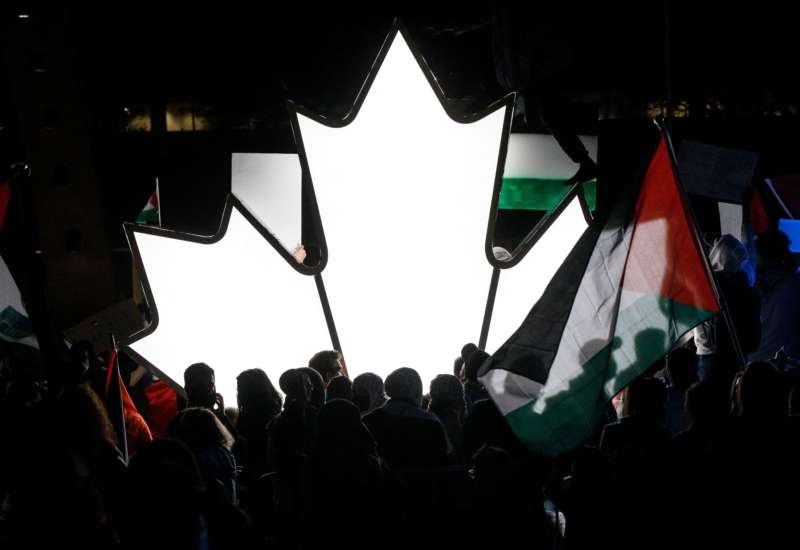Thousands of people across Canada, and around the world, have recently taken to the streets to protest the latest Israeli military action against Palestinians.
My research examines how Muslim Canadians often face severe consequences for protesting prevalent social understandings in Canada. National conversations and encounters with state institutions educate them about their “place.”
My most recent example of this is anecdotal and comes from a personal experience. In Hamilton, I attended a pro-Palestine rally with some friends. By our count, police issued tickets to at least eight Muslim women wearing hijabs out of a total of 12 tickets issued.
My close friend, who wears a hijab, had arrived at the protest earlier than me with her two school-aged kids. Although they wore masks and stood socially distanced from the small crowd of protesters, two officers approached her and spoke to her aggressively about her violation of the Ontario stay-at-home order. According to her, one of them said: “I can ticket you or arrest you.” They issued her two tickets, each over $800.
At that time, people were just beginning to congregate at the protest but Hamilton’s streets were full of people.
Ticketing these eight women who wear the hijab is racial profiling. This targeting is typical of patterns I have found in my research. As a researcher on Muslim Canadian citizenship, I examine what happens when Muslim Canadians challenge Canada’s social order.
Muslim Canadians who wear a hijab are seen to have less of a right to protest. They are called out more viciously, censured more severely and generally told to be grateful to the country that welcomed them — even if they are born and raised in Canada.
When it comes to Palestine, Muslim and Arab Canadians are expected to be silent. This connects to a wider pattern of systematically silencing anyone who advocates for Palestine. People with no ethnic connection to the region are targeted as well.
Progressive Except for Palestine
Last summer, the University of Toronto’s Faculty of Law attracted international attention after it rescinded its offer of employment to Valentina Azarova, a Germany-based human rights lawyer and scholar. The university stated that this was due to issues arranging a visa and work authorization. However, several others, including human rights organizations, believe the offer was rescinded over Azarova’s Palestinian human rights work. An investigation into the incident has since absolved the University of Toronto. However, numerous voices have challenged the integrity of those findings.
Vincent Wong, a lawyer, research associate and PhD student at the University of Toronto law school, was one of the hiring committee members and had a front-row seat to the entire process. He resigned from his job in protest. In an incisive analysis in OpinioJuris, an international law blog, Wong characterized the de-hiring and subsequent investigation as layers upon layers of white male privilege.
In April, the Canadian Association of University Teachers (CAUT), an association of over 70,000 members, voted unanimously to censure the University of Toronto for their racism and disregard for Azarova’s rights.
This is not an isolated incident. Across Canada, the atmosphere is menacing for those who would speak up for justice in Palestine.
Last week, Canadian journalists who signed a letter criticizing the lack of Palestinian voices in the media were reprimanded by their newsrooms. Long-time CBC journalist Pacinthe Mattar detailed her experiences in an article for The Walrus. She explains how her reporting a story on Palestine was likely used to block her promotion.
This global phenomena of being chilled into not talking about Palestine, no matter how progressive one may be, has a name: Progressive Except for Palestine. It refers to how many people take principled stands against injustice, but draw the line at Palestine. In this menacing climate, many people self-censor.
New Law Bars Criticism of Israel
In October 2020, the Ontario legislature adopted a controversial definition of antisemitism into law. The law conflates criticism of Israel with antisemitism. Discussions of justice for Palestinians have always been taboo in the West. Now, they carry the risk of significant legal consequences.
A large group of Jewish Canadian academics released a statement decrying the increasing pressure to adopt this narrow definition of antisemitism that shuts down solidarity with Palestinians. This definition, some of the signatories pointed out, bullies those advocating for Palestinian rights.
Global Land Rights
Immigrants to Canada, such as my friend from the protest, take a colonial oath of allegiance to the Queen. Part of that contract is freedom of expression under the Charter of Rights and Freedoms.
Every day, her children and countless other children across Canada, say Indigenous land acknowledgements. These land acknowledgements compel us to recognize how land and human rights injustices are woven together. This attention to how land and human rights are entangled should be both local and global.
Injustices towards the Palestinian struggle do not stop at the borders of Gaza or the boundaries of East Jerusalem. They are here, in Canada, towards people like the Muslim women at the protests, academics, journalists and countless others who speak up about the injustices happening in Palestine.
Thanks to Black Lives Matter and last summer’s anti-racism uprisings, the stage for racial justice has seismically changed. In recent years, Indigenous activism, especially the Idle No More movement, means more Canadians are aware of how human rights violations are inseparable from land injustices.
When will Canadians stop punishing those who call for justice for Palestine?
Lucy El-Sherif has received funding from the Ontario Graduate Scholarship.
This article is republished from The Conversation under a Creative Commons license. Read the original article.


